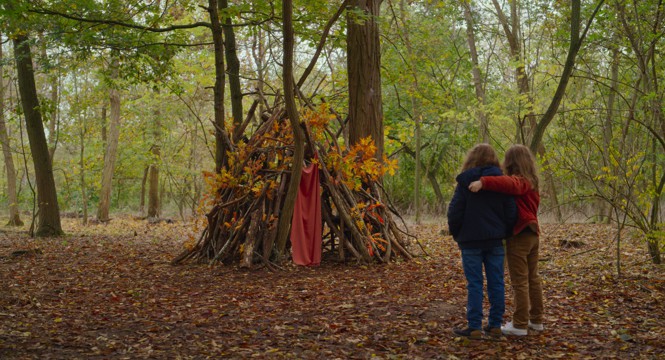
In the early scenes of Céline Sciamma’s gentle new film, Petite Maman, 8-year-old Nelly (played by Joséphine Sanz) is exploring a haunted house of sorts—the quiet abode of her recently deceased grandmother. The location is mundane. Nonetheless, it’s tinged with melancholy, a feeling that someone Nelly’s age would have trouble articulating, but that Sciamma expresses easily with every emptied-out room and stilted adult conversation happening around her young protagonist. Many viewers might find the setting familiar, a grounded base for a modest story that unexpectedly takes a flight of fancy.
Petite Maman is Sciamma’s latest contribution since the devastating Portrait of a Lady on Fire, a period romance that was the strongest work of the French director’s already exciting career. She’s wisely followed up that film’s soaring emotions with something much more contained and muted; Petite Maman is brisk, has only five speaking parts, and takes place almost entirely in and around Nelly’s grandmother’s house, where her family shuttles about eating cereal, going through boxes, and patting each other on the back. The scale is small, but also whimsical, because when Nelly explores in the woods outside the house one morning, she runs into another 8-year-old, named Marion (Gabrielle Sanz), who looks exactly like her—and is, she quickly realizes, her mother, somehow transported through time.
Sciamma’s script is not concerned with the physics of time travel, or exactly how it is that when Nelly follows Marion back home, she instead finds a version of her grandmother’s house from several decades ago. This is the lowest-energy sci-fi imaginable, but a perfect match for Sciamma’s cozy tone. She’s illustrating a childish fantasy: that you might one day get to know your parent as a peer, rather than as an authority figure. Through the uncanny casting of Joséphine and Gabrielle Sanz (who are twin sisters in real life), she conjures simple, wistful magic.

Many scenes in Petite Maman see Nelly and Marion playing—they build a fort from sticks in the woods, act out soap-opera skits, and make food for each other. In each case, their parents are curiously unruffled about two 8-year-olds scampering around without supervision, and barely raise an eyebrow at the fact that the pair seem to be each other’s exact doubles. That nonchalance just adds to the soft illusion, as if Nelly has spun herself a bubble, inside of which she will be untroubled by the concerns of grown-ups.
Perhaps weirdly, I was reminded most of Hayao Miyazaki’s animated classic My Neighbor Totoro, which is a film given to far more extravagant make-believe (flying creatures, a cat that’s also a bus, and the like). But it is also deeply interested in telling a story about children from their eye level, even if weightier concerns are in the background. In Totoro, the main characters’ mother is convalescing from illness. Similarly, Petite Maman does not ignore the obvious turmoil the parents are going through. The adult Marion seems disturbed to be packing up her dead mother’s home, and Nelly gains further insight into her maternal family’s dynamics as she keeps traveling through the past.
[Read: Hayao Miyazaki and the art of being a woman]
Despite the high-concept premise, Sciamma lets the story unfold through naturalistic, childlike dialogue. Nelly and Marion are primarily concerned with innocent things, but occasionally will let slip some half-understood piece of information they gleaned from a parent. Sciamma has always been good with young actors—her films Water Lilies, Tomboy, and Girlhood are all astute snapshots of adolescence, and the confusing dynamics that can often play out in schools.
Petite Maman keeps its vision tightly focused on Nelly and Marion, because this film is like a very particular memory, the kind you might recall as an adult and dismiss as some lingering, juvenile dream. The narrative is short, it’s hardly action-packed, and yet its topics are sweeping: coping with grief, growing up, and trying to understand a parent from a whole new perspective. Magna opera have been written on these topics for hundreds of years; Sciamma manages to cram numerous insights into just 72 minutes.







